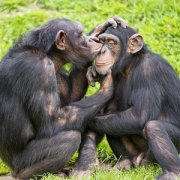Altruism toward strangers grows out of the emotional attachment between babies and their caregivers.
By Alison Gopnik
The last few weeks have seen extraordinary displays of altruism. Ordinary people have transformed their lives—partly to protect themselves and the people they love from the Covid-19 pandemic, but also to help other people they don’t even know. But where does altruism come from? How could evolution by natural selection produce creatures who sacrifice themselves for others?
In her 2019 book “Conscience,” the philosopher Patricia Churchland argues that altruism has its roots in our mammalian ancestry. The primordial example of an altruistic emotion is the love that mothers feel toward their babies. Helpless baby mammals require special care from their nursing mothers, and emotional attachment guarantees this care...
...In a 2017 paper in the journal Cognition, researchers Rachel Magid and Laura Schulz of M.I.T. showed that when we care for another person in this altruistic way, we extend our own needs to include theirs, in a process they describe as ”moral alchemy.” A caregiver—whether human or vole, mother or father or grandparent or alloparent—doesn’t just do what’s good for the baby because of an abstract obligation or an implicit contract. It’s because the baby’s needs have become as important to them as their own...

